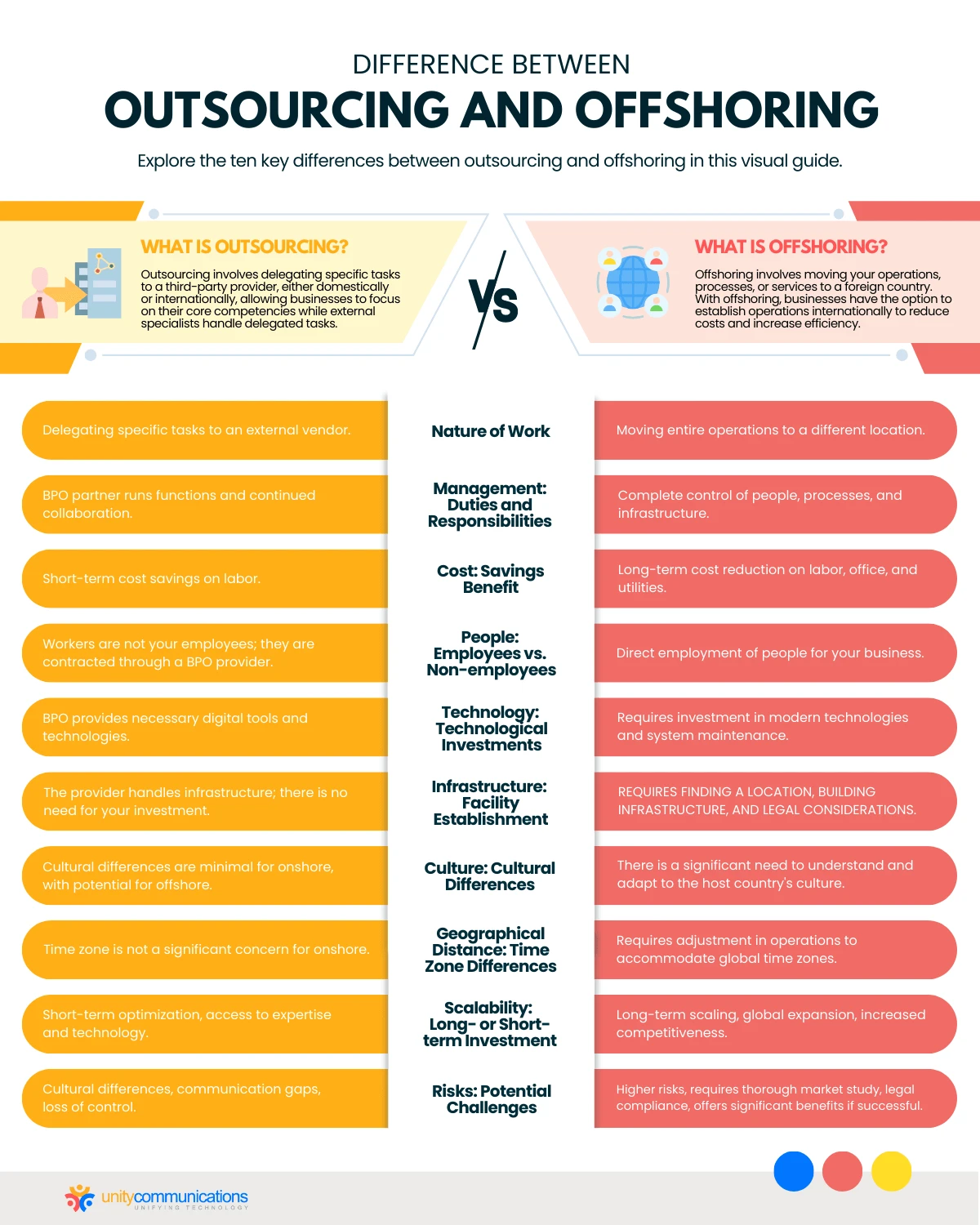Table of Contents
Two business solutions stand out for scaling operations and reducing costs: outsourcing and offshoring. Some companies outsource their business functions to Philippine offshoring providers or business process outsourcing (BPO) firms in their own country. Others offshore their operations to Latin America, Europe, or Asia.
But what is the difference between outsourcing and offshoring? Some businesses and professionals tend to use these terms interchangeably. However, proper use and differentiation are crucial to making informed business decisions.
Learn the differences between outsourcing and offshoring in the section below.
Outsourcing vs. Offshoring: The Main Difference

Understanding the difference between outsourcing and offshoring is crucial for businesses looking to scale and expand their operations. From there, you can decide which solution is best suited to your needs.
So let us cut to the chase: what is the difference between outsourcing and offshoring? Check out the definitions below.
- Outsourcing entails delegating functions to a third-party provider within or outside your home country. For example, you can consider business process outsourcing in the Philippines, Ukraine, or your country.
Outsourcing lets you entrust your tasks to a reliable external vendor and focus on your core operations. Your chosen service provider employs a robust workforce to handle your non-core functions.
- Offshoring involves moving your operations, processes, or services to another country. For example, you might establish an in-house call center for your help desk operation in India. Another popular option is to leverage software development in Romania, where you can benefit from a skilled workforce and competitive costs.
Through offshoring, you build a dedicated team of employees in another country to capitalize on lower labor and operating costs.
We dissected the terms for you in the table below to further illustrate the differences between outsourcing and offshoring.
| Outsourcing | Offshoring | |
|---|---|---|
| Definition | Contracting work to a third-party service provider | Getting work done overseas |
| Action | Delegating functions or tasks to an external vendor | Relocating operations or jobs to a different country |
| Goal | Mainly to focus on core operations | Primarily to reduce labor and operating costs. |
| Workforce | Non-employees of your organization (but your BPO vendor’s employees) | A dedicated team consisting of remote employees |
| Location | Within or outside your country | Outside your country |
Ten Key Differences Between Outsourcing and Offshoring

Outsourcing and offshoring have become increasingly popular as effective business solutions. They both offer several potential benefits, from reducing costs to streamlining operations to growing businesses.
The proof is in the numbers. The global outsourcing services market could grow from $620.38 billion in 2020 to $904.95 billion by 2027. The sector is projected to achieve a 5.54% compound annual growth rate (CAGR).
Meanwhile, top brands have long-established offices in different parts of the world. For instance, they do not only employ BPO in the Philippines; they also build in-house centers in the country. Likewise, a growing number of small and midsize businesses (SMBs) have begun offshoring since the pandemic.
But what is the difference between outsourcing and offshoring? Explore the ten key differences below:
1. Job: Nature of Work
The main difference between outsourcing and offshoring is the nature of the work done.
Outsourcing entails delegating specific tasks or functions to an external vendor. Meanwhile, offshoring involves moving entire operations, processes, or services to a different location.
Case in point: You can consider outsourcing to the Philippines to have a BPO company handle your customer service. But when offshoring, you establish, own, and operate a call center in the country for this business function.
2. Management: Duties and Responsibilities
To understand the difference between outsourcing and offshoring, consider the level of management required for each business solution.
With outsourcing, you give your BPO partner the freedom to run your business functions. However, you continue to communicate and collaborate with them, using technologies such as Flipbooks, email and employee management tools.
On the other hand, offshoring requires complete control of your operation, meaning overseeing your people, processes, and infrastructure to ensure a smooth operation.
3. Cost: Savings Benefit
What is the difference between outsourcing and offshoring? The cost-saving benefit can answer that for you.
Offshore outsourcing is a cost-effective solution for specific or short-term projects. It lets you save money on labor expenses by up to 70%. But when you outsource onshore, cost reduction might not be your business objective.
On the other hand, offshoring is best for cost reduction in the long term. It allows you to cut labor and other operating expenses, such as office leases and utilities.
4. People: Employees vs. Non-employees
The workforce is vital to deciphering the difference between outsourcing and offshoring.
When you outsource, the agents handling your tasks are not your employees. Instead, they have individual contracts with your BPO service provider. Meanwhile, offshoring means hiring people who are your actual employees.
What does the difference imply? Outsourcing has no direct investment in people; offshoring requires you to invest in new teams and build relationships with them.
5. Technology: Technological Investments
Technological investment is another key difference between outsourcing and offshoring.
Outsourcing does not require you to invest in digital tools and technologies. Your BPO company usually has the resources to handle your business functions.
But when offshoring, you must invest in modern technologies to keep your operation running. You are also responsible for deploying, maintaining, and updating your systems.
6. Infrastructure: Facility Establishment
“Infrastructure” refers to a business’s physical and logistical requirements. It is a clear indicator of their significant differences.
When outsourcing, you need not worry about building infrastructure. Your hired provider has the facility and resources to run their operations and handle your business functions.
Meanwhile, offshoring requires finding a location, establishing infrastructure, and investing resources. You must also consider the legal and regulatory requirements for setting up an office in the country of your operation.
7. Culture: Cultural Differences
Consider the cultural differences between outsourcing and offshoring. Cultural differences are not a major concern when you employ onshore outsourcing, but they are when you outsource to a nearby or overseas BPO provider.
You must be open to cultural differences when offshoring since you are establishing your operation in a different country. For instance, customer service outsourcing in the Philippines requires understanding the country’s culture, traditions, practices, and even holidays.
8. Geographical Distance: Time Zone Differences
The geographical distance is another key difference between outsourcing and offshoring. Time zone differences might influence your collaboration and operations.
The time zone does not affect your business much if you work with an onshore BPO provider. However, you should be wary of this if you outsource overseas.
With offshoring, you need to work according to the time zone differences. For instance, you should create shifting schedules to accommodate customers on the other side of the globe.
9. Scalability: Long- or Short-term Investment
Scalability is vital to growing and expanding your business. That is why some companies choose to employ outsourcing or offshoring.
Outsourcing business operations helps you optimize processes in the short term. It gives you access to expertise and technology to streamline your processes and improve your services.
Offshoring is best for scaling your operations over the long term. It also allows you to expand globally by reaching a broader market, making your business more competitive.
10. Risks: Potential Challenges
As with any business strategy or solution, outsourcing and offshoring have advantages and disadvantages.
Outsourcing comes with a few challenges. For one, you must prepare for the pros and cons of outsourcing to the Philippines. While it allows you to cut costs, it requires understanding cultural differences, bridging communication gaps, and maintaining business control.
Meanwhile, the risks are higher when you establish your operations in a different country. Offshoring requires due diligence, from studying the market to complying with laws and regulations. But when successfully implemented, you can reap various benefits, such as significant cost savings and global expansion.
The Bottom Line

To cap off this blog, what is the difference between outsourcing and offshoring? Outsourcing is delegating functions or tasks to a third-party vendor; offshoring is moving jobs or operations to another country.
Outsourcing and offshoring are viable options for businesses looking to reduce costs, scale processes, and expand operations. Understand, however, that they are not interchangeable terms. So, you must know their differences to make informed business decisions.
Looking to outsource your tasks to a Philippine BPO provider? Let’s connect; Unity Communications can help you scale your operations and save money long-term.



